| Srl | Item |
| 1 |
ID:
127093
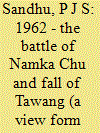

|
|
|
| 2 |
ID:
131763
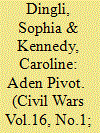

|
|
|
|
|
| Publication |
2014.
|
| Summary/Abstract |
This article argues that the Aden Insurgency was a pivotal moment in the history of British counter-insurgency. We argue that it was in Aden where the newfound strength of human rights discourse, embodied in Amnesty International, and of anti-colonial sentiment, expressed by the UN General Assembly, forced the British government to pay attention to public perceptions of colonial brutality. Using archival sources, we foreground three episodes in the history of the insurgency to support our argument and to illustrate that the changes witnessed were not the result of 'learning' but of a fundamental shift in the international environment.
|
|
|
|
|
|
|
|
|
|
|
|
|
|
|
|
| 3 |
ID:
141654
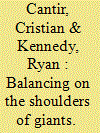

|
|
|
|
|
| Summary/Abstract |
“Soft balancing” has emerged as a way to reconcile realist theory with the lack of hard balancing behavior against US hegemony. Scholars continue, however, to disagree on the concept's utility and causes. Consistent with its realist roots, scholars have primarily focused on power imbalance and external threat to security as causes of soft balancing. This article analyzes Moldova's major foreign policy shift in the mid-2000s. It argues that this was a clear example of soft balancing and that it adds several important insights into the causes of soft balancing. While the power imbalance and external threat from Russia were persistent throughout Moldova's post-independence history, the country only adopted a soft balancing strategy once Russia posed a threat to the internal stability of the government and changes in EU policy created a permissive international environment for the strategy. Moreover, we argue that the domestic political environment played a key role in enabling the adoption of this strategy. This article therefore diversifies the analysis of the causes of soft balancing and provides a theoretical answer for the puzzle of Moldova's pro-Western turn in 2003.
|
|
|
|
|
|
|
|
|
|
|
|
|
|
|
|
| 4 |
ID:
176966
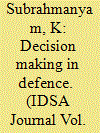

|
|
|
| 5 |
ID:
085126
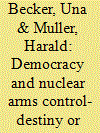

|
|
|
|
|
| Publication |
2008.
|
| Summary/Abstract |
Is there a particularly democratic way of dealing with nuclear arms control? Against the background of democratic peace (DP) theory, and using Immanuel Kant's writing as a starting point, this article argues that democracies should indeed develop a preference for arms control, but that Liberalism as well as the nature of nuclear weapons opens the possibility for contingent developments within a DP framework. While DP theory can thus account for the existence of variance, we maintain that a social constructivist complement based on role, identity, and enemy perception can best explain why a given democracy follows a specific path. Case studies of six Western democracies reveal a considerable variance in their nuclear arms control policies, which can indeed be traced back to the countries' respective roles, identities, and images of the Kantian "unjust enemy."
|
|
|
|
|
|
|
|
|
|
|
|
|
|
|
|
| 6 |
ID:
021550
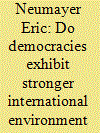

|
|
|
|
|
| Publication |
March 2002.
|
| Description |
139-164
|
|
|
|
|
|
|
|
|
|
|
|
|
|
|
|
| 7 |
ID:
120528
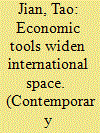

|
|
|
| 8 |
ID:
133850
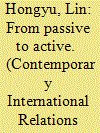

|
|
|
|
|
| Publication |
2014.
|
| Summary/Abstract |
As one of the victorious allies of World War - I, China attended the Paris Peace Conference in 1919. Toa certain extent, the conference can be regarded as the true beginning of global governance. It was followed by the establishment of the Versailles-Washington System. The first international pattern with world participation
|
|
|
|
|
|
|
|
|
|
|
|
|
|
|
|
| 9 |
ID:
106832
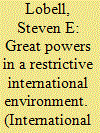

|
|
|
| 10 |
ID:
099588
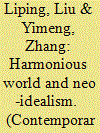

|
|
|
| 11 |
ID:
023029
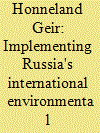

|
|
|
|
|
| Publication |
Dec 2002.
|
| Description |
1223-1240
|
|
|
|
|
|
|
|
|
|
|
|
|
|
|
|
| 12 |
ID:
118713
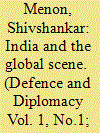

|
|
|
| 13 |
ID:
121641
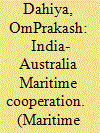

|
|
|
|
|
| Publication |
2013.
|
| Summary/Abstract |
India and Australia have assumed a greater role in international affairs, emerging as regional powers with great power potential. Changes in the international environment, particularly the rise of China as a common source of concern and growing economic relations between the two countries in an era of increasingly complex interdependence, have provided an impulse for the two countries to enhance their bilateral ties. Part of that includes developing a robust maritime capability that can project force across blue water as well as on land, and which works in concert with allied maritime forces in assuring the defence of common interests. The paper provides an overview of the Indian-Australian relationship, focusing the analysis on India's changing maritime outlook, Australia's strategic priorities and a forecast of the possibilities for their developing a strategic partnership in the Indo-Pacific region.
|
|
|
|
|
|
|
|
|
|
|
|
|
|
|
|
| 14 |
ID:
019752
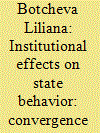

|
|
|
|
|
| Publication |
March 2001.
|
| Description |
1-26
|
|
|
|
|
|
|
|
|
|
|
|
|
|
|
|
| 15 |
ID:
127483
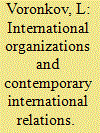

|
|
|
|
|
| Publication |
2013.
|
| Summary/Abstract |
SOVEREIGN STATES traditionally build their relationships with external actors and partners in the interest of creating a favorable international environment for the effective achievement of national goals. The foreign policy of states performs a very important, but mainly an auxiliary function in dealing with their internal problems.
In recent decades, due to the growing interdependence of modern states, the internationalization of their life and the deepening of globalization processes, the significance of international factors for successfully dealing with national matters of individual states has increased markedly. International and domestic aspects of their policies are becoming more organically interlinked. This induces states to look for ways to raise their role in shaping a favorable international environment for national development.
|
|
|
|
|
|
|
|
|
|
|
|
|
|
|
|
| 16 |
ID:
096563
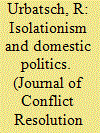

|
|
|
|
|
| Publication |
2010.
|
| Summary/Abstract |
Isolationism has long been seen as a reaction against domestic economic conditions or a threatening international environment, but domestic politics could equally spur such a reaction. Disagreement with current foreign policy or opposition to political parties directing foreign policy may provoke negative feelings on the general prospect of international engagement. Some of what appears to be isolationism, then, is not a universal rejection of international intervention but is instead contingent on partisan control of the executive. Data from the American National Election Studies confirms this: copartisans of the president are substantially less likely to agree with isolationist statements or simultaneously to support isolationism and specific interventionist policies. In addition to further illuminating the sources of public opinion about foreign policy, these findings suggest that some common measures of isolationism may not measure what they intend to measure.
|
|
|
|
|
|
|
|
|
|
|
|
|
|
|
|
| 17 |
ID:
132869
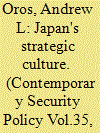

|
|
|
|
|
| Publication |
2014.
|
| Summary/Abstract |
Japan has shown three distinct strategic cultures since its emergence as a modern state in the 19th century: isolationist and non-military, militarist, and post-World War II strategic culture characterized by great reluctance to use military power abroad, even in collective self-defence. This article examines Japan's strategic culture and the potential for a fourth distinct strategic culture through the broader framework of security identity, arguing that this is evolving but has not changed as much as one might expect due to institutionalized antimilitarism and political support for the security practices it has engendered. Contemporary Japanese strategic culture can be understood through debates over recent Japanese security policy as well as actual changes in security practice. Domestic politics and a changing international environment are likely to lead Japan to a somewhat more active military role in the near term, but an analysis based on the dynamics of Japan's dominant security identity suggests that its strategic culture will continue to show a reluctance to use or develop military power beyond very limited scenarios, despite vocal efforts by some political actors to increase military activity abroad.
|
|
|
|
|
|
|
|
|
|
|
|
|
|
|
|
| 18 |
ID:
024569
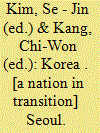

|
|
|
|
|
| Publication |
Seoul, Research Center for Peace and Unification, 1978.
|
| Description |
304p.hbk
|
|
|
|
|
|
|
|
|
|
|
|
Copies: C:1/I:0,R:0,Q:0
Circulation
| Accession# | Call# | Current Location | Status | Policy | Location |
| 018069 | 951.95/KIM 018069 | Main | On Shelf | General | |
|
|
|
|
| 19 |
ID:
021109
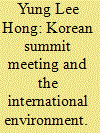

|
|
|
|
|
| Publication |
Summer 2001.
|
| Description |
91-124
|
|
|
|
|
|
|
|
|
|
|
|
|
|
|
|
| 20 |
ID:
131045
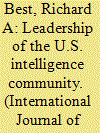

|
|
|
|
|
| Publication |
2014.
|
| Summary/Abstract |
Intelligence agencies exist to support government officials with information and analysis; unlike some academic institutions, they do not exist simply to promote the greater diffusion of knowledge. Intelligence officials serve a wide array of masters-Presidents, diplomats, policy planners, military commanders, and other government officials. In the United States, the need to support these diverse masters has brought into existence a complicated and cumbrous community of some seventeen organizations. 1 These agencies have been created over many years to describe and analyze the international environment and, ideally, give advance warning of imminent developments.
|
|
|
|
|
|
|
|
|
|
|
|
|
|
|
|